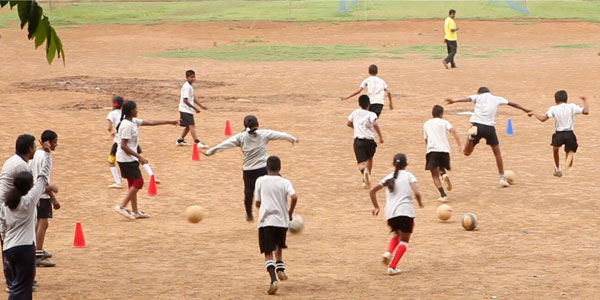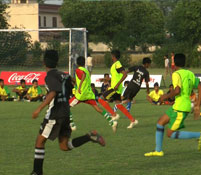
As you watch Saktheshwari skillfully dribble a football, her face intense with concentration, it’s hard to believe that this 21-year-old spent the better part of her childhood selling fish at Vyasarpadi, a slum in Chennai. Her father was an alcoholic, and Saktheshwari dropped out of school to help her mother run the household. The few moments of escape lay in watching the neighbourhood boys play football. Her keen interest caught the attention of the Slum Children Sports Talent Education Development Society (SCSTEDS), a Tamil Nadu-based organization. SCSTEDS uses games to impart positive life skills to children living in slums, enabling them to assert their rights for a more qualitative life.
Saktheshwari enrolled in SCSTEDS’ Girl Scout programme and eventually re-enrolled in school. She went on to play national and international football matches and in 2011, represented India at the Homeless World Cup. “I am a role model for all the girls in my community,” she says. “I will be there to motivate them, to encourage them. I will always be by their side.” Thangaraj of SCSTEDS says, “The game gives kids a fighting spirit. In the beginning it was difficult to get the girls to participate, but now the situation has changed.”
Reaching out to the community to enable a participatory spirit is essential, believes Abhijeet Barse, CEO, Slum Soccer, which runs programmes in 15 cities across India and is behind several global initiatives like Coaches Across Continents and the Homeless World Cup. “In soccer, there are 22 people running behind a ball,” says Barse. “We start off by playing the game and then move on to more serious issues. There is something inherent in the sport that makes it easy for kids to get together.” In May 2014 the first graduation ceremony of Slum Soccer’s Young Leadership Programme was held in Nagpur. 40 young boys and girls had received training and grooming to become future leaders. They were trained for a period of one year. These 40 will now help other slum children get equipped with social skills and other qualities before they go out into the world.

One of Slum Soccer’s biggest stars is Akansha, who, like Saktheshwari, dropped out of school when she was just 12, to help her widowed mother run the household. The programme helped her find her way back to school. Having never played soccer in her life, she initially struggled to grasp the moves, but her love for the game kept her going and she found a place in the Maharashtra state team. Inspired by Akansha, her younger sister too has started playing football.
A big factor that helps motivate these children to dream big is the presence of mentors from their own community, who relate to their circumstances. So very often, youth from the community initiate programmes to help other children enroll. (Read more about Slum Soccer’s programmes here)
“There is no denying that sports can change the lives of children living on the streets,” says Shanti, a community co-coordinator with Magic Bus India Foundation, which works with children from marginalized and at-risk communities. “We have witnessed a change in the communities we work in. Children who were not studying earlier have gone back to school and have become responsible. Earlier, parents would not allow girls to play and the idea of them wearing shorts was looked down upon. Now parents want to send their girls to school, and boys who were moving around in criminal gangs have found a new direction.”
Parvati Pujari is one of the many faces of change that soccer brings with it. Parvati’s parents were construction workers and she rarely attended school. Her day was spent working at home, tending to her three younger siblings. Like her two older sisters, she too was set to get married in her early teens - until a three-day camp conducted by Magic Bus triggered off a thirst to do more. She started attending the games with her sisters and even started going to school regularly. When her parents objected, she took the help of Magic Bus and convinced them to let her study. She went on to complete her graduation and today runs a support group for girls called Lehar.